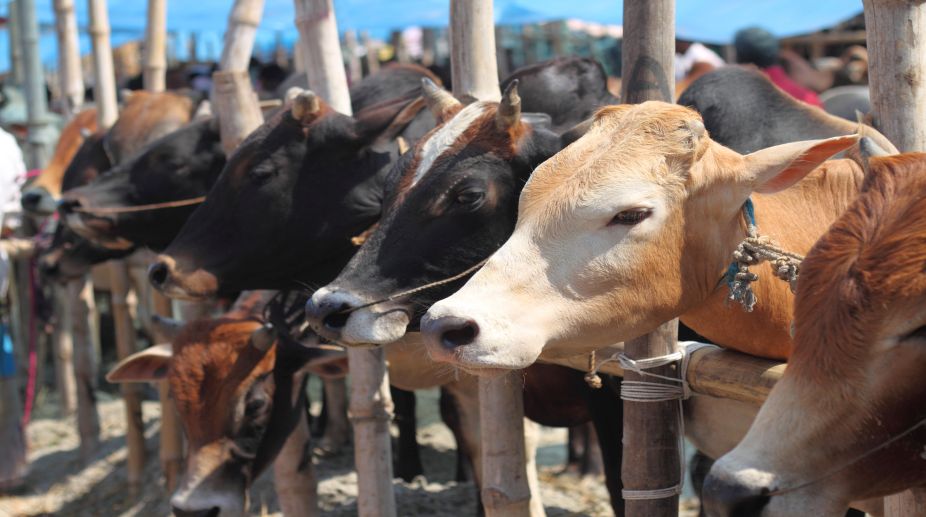Assam’s beef ban sparks regional uproar in the northeast
The Assam government's decision to amend the Assam Cattle Preservation Act, 2021, has drawn sharp criticism and ignited debates across the northeastern region and beyond.

(Photo: Getty Images)
Some years back I was visiting remote villages of Barmer district which were badly affected by a prolonged drought. Hungry and thirsty cattle looked like they could collapse any time. So it was a real relief to see small cattle camps where fodder and water was being arranged for at least some of the affected animals.
There was never enough water and fodder even for the limited number of animals who made it to the camp, but it was nice to see many people working so hard to save as many cows, bullocks and calves as possible. When I spoke to caretakers they explained how their region was once known for its famous breeds of cows.
Advertisement
When I persisted with my questions, they directed me to an elderly Jain who they said was the authority on this subject. This gentleman with a lifetime of cow protection work behind him told me that the best cow breeders of the region used to be Muslim pastoral people who after partition were left on the other side of the border.
Advertisement
Paying glowing tribute to their contribution to the maintenance of high quality indigenous breeds, he said that cattle-breeding had suffered in the region after artificial boundaries were drawn at the time of partition, although he had done his bit to reduce this damage and protect indigenous breeds.
Subsequent inquiries revealed how several other Muslim communities had been making valuable contribution to the breeding of cows and buffaloes in India. This is only one aspect of the completely misdirected zeal of so-called cow protectors who have hijacked the useful agenda of cow-protection towards antiminority violence. There is a danger that the wider and equally useful agenda of vegetarianism may be similarly hijacked and so it is important for sincere vegetarians and cow-protectors to resist this.
From a rational and secular viewpoint well-reasoned arguments have been advanced in favour of vegetarianism from several perspectives including saving food and water resources because meat-based diets use more grain and water than vegetarian ones. Related to this is the assertion that vegetarianism is more eco-friendly.
Then there are several kinds of arguments about vegetarian diets being more healthy, particularly if these are careful to avoid high-fat and high-sugar foods and emphasise fresh and boiled vegetables instead, but counter- assertions about meat, fish and eggs providing badly needed nutrients to many people are equally valid.
Given the increasing pressures on environment as well as food and water resources, rational arguments would on balance appear increasingly to favour a trend towards vegetarianism. This is reflected in the shift towards vegetarian based diets by a significant number of people on rational and secular grounds, particularly in some western countries. Important though such arguments are, these do not by themselves constitute the core, the base of vegetarian thinking.
The essence of vegetarianism is based on a thinking of non-violence and compassion for all forms of life. As the most capable specie on earth, human beings should necessarily accept a protective role towards other animals, birds etc. In various ways, the duties of this protective life are hindered if human beings eat animals and birds, while this protective role is helped if human beings restrain themselves from this voluntarily.
As the essence of vegetarianism is respect for all life, compassion and nonviolence, use of any violence for spreading vegetarianism in a limited or wider way should be absolutely ruled out by any sincere or true vegetarian. A way of life based on non-violence can never progress by using violence.
The tradition of cow-protection and its recent misuse should be seen in this wider context. While the basic principle of vegetarianism emphasises respect for all forms of life, there is space within this for special care for some species in the special socio-economic or cultural context of any region or community. Over large parts of India conditions have been conducive for providing such special care to cows.
Traditionally the farming and nutrition needs of many rural communities were served exceptionally well by cows and bullocks. Well- bred indigenous species feeding on well-maintained pastures provided highly nutritious milk used to prepare a wide range of milk products for home consumption as well as a source of income.
Indigenous bullocks provided excellent draught-power in farms and many farmers took great pride in their strong and healthy bullocks. The dung and urine of cow were greatly valued for their role in enhancing and maintaining fertility of land. Various family members particularly children and women developed strong attachment to their favorite cows and their affection was reciprocated by the animal.
Of course the breakdown of traditional systems accentuated greatly by distorted policies disturbed this traditional system in various ways, but a proper understanding of the essence of cow protection will be helped by linking it to its roots.
The basic foundation of vegetarianism – as well cow-protection as a part of it – rests on a philosophy of non-violence and compassion for all life and so any attempts to hijack this thinking towards violence against any vulnerable community should be strongly resisted.
On the other hand there is enormous scope for very useful and creative work for strengthening vegetarianism and cow-protection while remaining true to their basic principles.
(The writer is a freelance journalist who has been involved with several social movements and initiatives.)
Advertisement